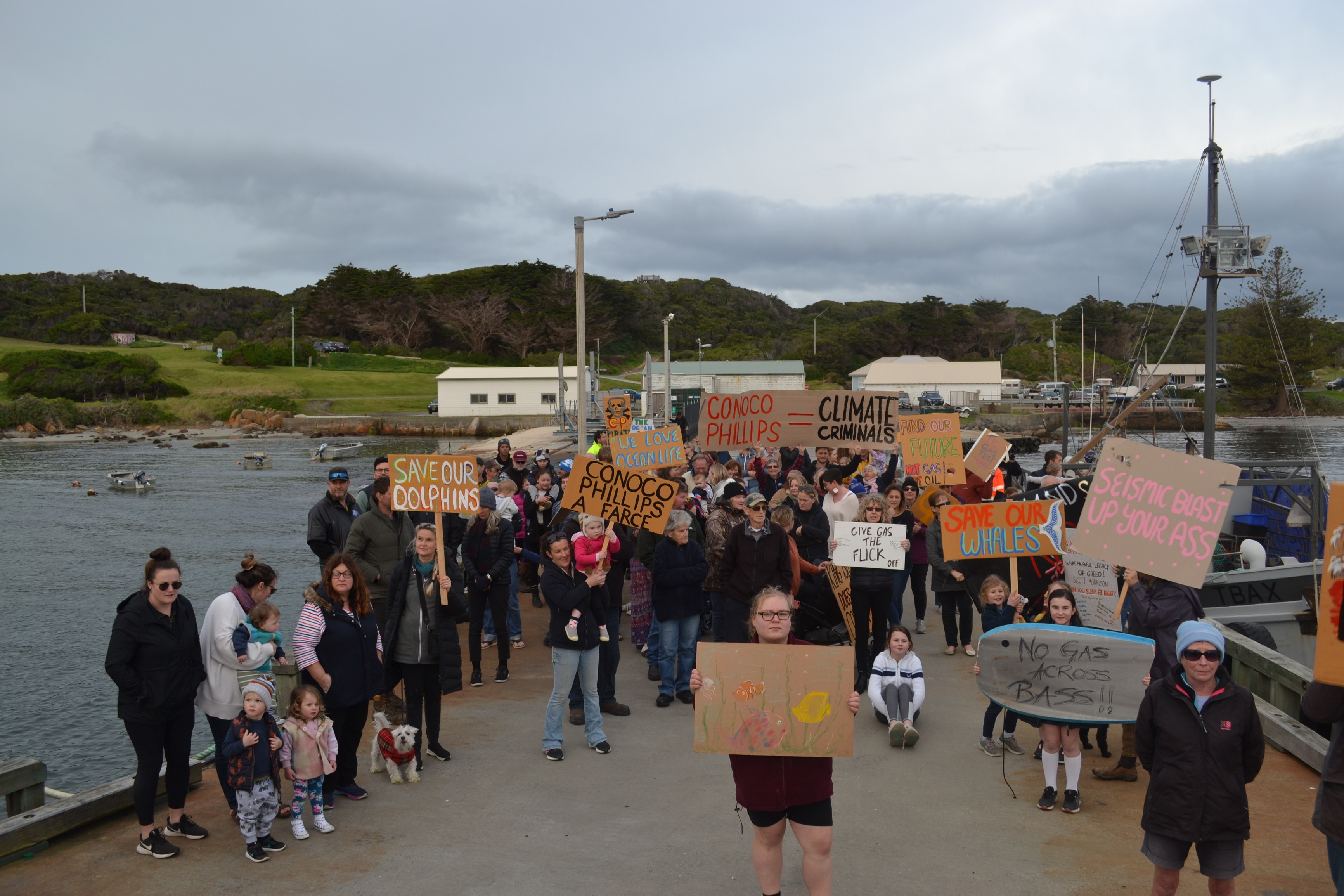Media Releases - 25 November 2022
Australians don’t have a meaningful say on the environment, report reveals
Report shows a systemic failure to uphold community rights in environmental decision-making across Australia.
Reaffirms the 2020 independent Samuel Review’s recommendations to improve transparency of information, community participation and access to justice.
Albanese government must not squander this opportunity to deliver environmental laws that work for nature and the community.

The people of King Island hold a rally to oppose seismic testing in the Bass Strait.
Australia ranks number one in the world for mammal extinctions. The country ranks second behind Indonesia for biodiversity loss and is a global deforestation hotspot.
A new report, released today, reveals that environmental and planning laws do not give communities a real say in environmental decision-making and this is why governments are failing to deliver on community demand to protect our unique species and ecosystems.
The report is released in the lead up to the Federal Environment Minister Tanya Plibersek’s early December response to the 2020 independent review (‘the Samuel Review’) of the EPBC Act, when the Albanese government will signal the scope of its ambition for the reform of the federal environmental laws.
The report, published by the Wilderness Society, highlights key failures that will need to be addressed in the Albanese government’s promised reform of the Environment Protection and Biodiversity Conservation Act (EPBC Act) if it is to restore the integrity of Australia’s nature law.
A key finding of the report, based on legal analysis conducted by the Environmental Defender’s Office (EDO), is that there is a continental and systemic failure to uphold community rights in environmental decision-making across Australia.
It’s been 30 years since the 1992 UN Rio Declaration called for environmental community rights to be adopted by nations, with Australia as a signatory. But no government in Australia has yet enshrined strong community rights—the right to know, to participate and to challenge1—into legislation and practice.
For this report key environmental legislation at both State and Federal levels was assessed against 16 criteria to determine how well it supports community rights in relation to environmental decision-making.
Some of the worst failures in the federal EPBC Act include:
Short timeframes for public consultation on matters of national environmental significance
Limited legal requirements that the Minister take the community’s views into account in making their decision
No possibility of merits review2 of a decision made by the Minister in relation to the assessment and approval of proposed development actions
At the state/territory level, some governments—such as in the Northern Territory and Western Australia—are failing across the board.
Even relatively high-scoring governments, like the ACT and NSW, have major gaps where they are failing to provide for key rights such as basic access to information or correspondence and the continuous disclosure of risk.
Disappointingly, the only community right that all governments do well is letting community members know in writing when their request to access information is being refused.
The report reaffirms the 2020 independent Samuel Review’s recommendations for a reformed EPBC Act to improve transparency of information, community participation and access to justice.
“For years the Wilderness Society has worked with communities that are overwhelmingly opposed to destructive projects, but those projects go ahead because corporations have a more powerful voice in our system,” said Wilderness Society Campaigner Victoria Jack.
“Across the country, there is an acknowledged lack of trust in how decisions are made—and who is making them.
“The community wants laws that will give them a voice in environmental decisions, so they can effectively demand that the government take the serious and urgent action required to fix both the climate and biodiversity crises.
“The Albanese government must not squander this opportunity to deliver environmental laws that work for nature and people.
“Getting it right will require a commitment to delivering a package of bold reforms, including a strong approach to the three environmental community rights—the right to know, to participate and to challenge.
“The rights support each other to create a more fair and effective system, so the reforms must deliver on all three if the Albanese government genuinely wants to deliver fit-for-purpose nature laws that restore trust and integrity to environmental decision-making.
“Additionally and specifically, First Nations rights derived from the UN Declaration on the Rights of Indigenous Peoples (UNDRIP) articulating the principle of current, free, prior and informed consent, should be embedded across jurisdiction decision-making processes.”
“People do not have a full range of rights in relation to environment and planning decisions anywhere in Australia,” said EDO Head of Policy and Law Reform Rachel Walmsley.
“Simply having a Freedom of Information officer in a department, or inviting public comment on a government website, does not meet internationally recognised standards for community rights.
“Laws may look okay on paper, but our clients regularly experience huge delays, expense, bureaucratic roadblocks, and consultation fatigue in their attempts to protect the places, plants and animals they love.
“Environment and planning laws at state and federal level must be reformed to address these serious shortcomings.
“National standards and amendments to strengthen community rights must form part of the government reforms to fix our national environment laws.”
You can find a scorecard, summary and link to the full report here.
For further comment contact Wilderness Society Campaigner Victoria Jack on 0481 125 427.
References
1. Established under the Rio Declaration, the three environmental community rights are: 1. The right to know: access the information held by authorities and proponents; 2. The right to participate: have a meaningful say in decision-making; 3. The right to challenge: seek legal remedy if decisions are made illegally or not in the public interest.
2. A merits review is a type of legal review that considers all of the evidence about a decision and determines what the preferable decision is. In contrast, a judicial review looks at the lawfulness of a decision and whether the decision-maker followed the correct legal process.